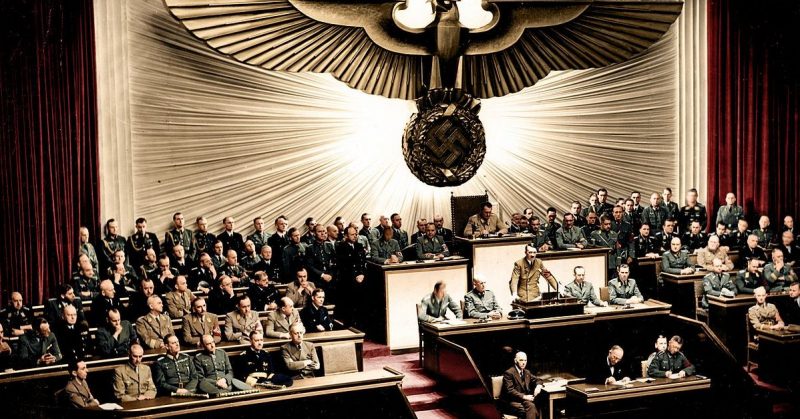The German government is investigating the extent to which ex-Nazi officials were involved in the chancellery, ministries, and agencies after the end of World War II. It’s an attempt to shed light on one of the most complicated aspects of the nation’s history.
The $4.2 million (4 million euros) inquiry is expected to take until 2020, according to a statement from the German Ministry of Culture. 25% of that amount is earmarked for investigating the amount of influence Nazis had over the Federal Chancellery, which includes the Chancellor and their staff.
The investigators are seeking to find personal connections between Nazi officials prior to 1945 and how those connections formed a network running through the chancellery, federal ministries, and regional authorities in the years after the war.
At the center of the investigation is Hans Globke. Globke was chief of staff to Konrad Adenauer, the first post-WWII chancellor, from 1953 to 1963.
Globke had previously worked in the Nazi Interior Ministry. He co-wrote the official legal commentary to the Nuremberg laws which were used to round up and deport German Jews during the Holocaust.
During the war, Globke worked for Wilhelm Frick, the Nazi Interior Minister who was executed for war crimes in 1946, and Heinrich Himmler, the chief of the SS.
After the war, Globke denied being a loyal Nazi, claiming that he joined the Nazi Party for career purposes only. Two years before Hitler came to power, in 1932, when Globke worked at a regional interior ministry in Prussia, he wrote a set of rules that made it more difficult for German Jews to change their last names to ones that weren’t so obviously Jewish.
Since Globke was in charge of the recruitment policy under Chancellor Adenauer, the committee will be looking closely at who was offered jobs in the West German government. It is not known at this point whether Adenauer, the mayor of Cologne while Hitler was in power, will be part of the investigation.
The committee will also be examining Nazi lawyers who became senior officials in the West German Justice Ministry. According to an October report from the government, about 77% of the ministry’s officials were former Nazis in 1957.
Christopher Safferling, the co-author of the study, evaluated many files of justice ministry officials and was surprised to see the high number of officials with ties to the Nazi party.
The inquiry may run into trouble, though. Many files that contain information about former Nazi officials are still classified, and some files were destroyed by the German secret services.
The BND, the German intelligence agency, was criticized for shredding files with conflicting information about whether Alois Brunner, a high-ranking officer in the SS and a confidant of Holocaust architect Adolf Eichmann, ever worked for the agency.
Other inquiries have been performed by the Foreign Office, the criminal police, and BfV (the counter-intelligence agency). There are critics who doubt the independence of the researchers involved in the inquiry. Left Party MP Jan Korte is one of those critics, RT News reported.
Last month, Korte spoke in front of the Deutsche Welle. He claimed that government agencies tend to exert control over the researchers and force them to make concessions, including not making public statements during the investigation. All public statements are required to be discussed with the head of the project at the BfV before being released.
“That is censorship and not befitting of what’s at stake here,” said Korte.
